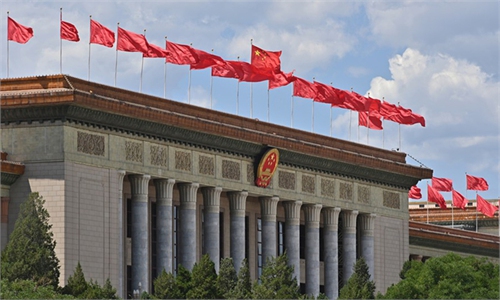TWO SESSIONS 2024 / OPINION
China's high-quality development centered on the people, not on capital

The view of the Yangtze River Bridge in Southwest China's Chongqing. Photo: VCG
Editor's Note:
China's annual two sessions have begun this week. This critical series of meetings in spring is vital to defining China's approach to economic, political and foreign policy issues for the whole year. It also offers observers a window into the latest ideas and practices of China's development in various aspects, including the whole-process people's democracy, high-quality development, Chinese modernization and the wisdom the country provides to global governance.
In the third piece of the series "Two sessions inspirations," Elias Khalil Jabbour (Jabbour), Advisor to the Presidency at New Development Bank and an associate professor at the School of Economics of Brazil's Rio de Janeiro State University, shared his views with Global Times (GT) reporter Xia Wenxin on his projection for the outlook of the Chinese economy in 2024, the country's high-quality development and its significance to a world striving for steady economic growth.
GT: What are your expectations for this year's two sessions? What do you think about the significance of this event and the decisions to be made?
Jabbour: China has a very peculiar political system that I call "non-liberal democracy," which means that Chinese democracy is a historical construction where the people increasingly have power over the country's destiny - very different from liberal democracies where the power of money and capital supersedes the interests of society.
In this sense, the two sessions have been characterized, in recent years, by decision-making that directly impacts the lives of the Chinese people. For example, major deliberations and institutional innovations deliberated by the National People's Congress and widely discussed in the Chinese People's Political Consultative Conference have enabled China's victory over extreme poverty and the establishment of the world's largest social security system. At the heart of this process are the Communist Party of China and the Chinese people represented by the country's top legislature and top political advisory body.
I believe that the decisions to be made during the two sessions will have a significant impact, for example, on the direction of Chinese industrial policies in a world where attempts at "decoupling" and "de-risking" by the US are a reality. China's socialism is the target of an attempt at "technological suffocation." The decisions to be made during the two sessions should aim to increase efforts for Chinese technological self-sufficiency.
GT: What achievements has China made in realizing high-quality development? What is the concrete connotation of China's high-quality development?
Jabbour: High-quality development can be seen in various ways: A development that, for example, seeks greater harmony between human beings and nature. In this sense, comparisons are fundamental. The high-quality development that China seeks has already realized numerous results. China invests more in green industries and clean energy sources than the US and the European Union combined. China has two times more high-speed train lines than the rest of the world combined. Why? Because socialism with Chinese characteristics allows for such decisions to be made without the pressure from big private industry lobbies of oil and the automotive industry on the socialist state.
The concrete connotation of high-quality development is still a concept under construction, but it already expresses itself in the Chinese government's effort to fight against environmental, social and regional imbalances generated by four consecutive decades of high economic growth. It is development centered on the people, not on capital.
GT: The Chinese economy has long been one of the strongest driving forces for global recovery. In your opinion, will this momentum be maintained in 2024? China on Tuesday has set its 2024 economic growth target at around 5 percent. What is your projection for the Chinese economy in 2024?
Jabbour: The Chinese economy will continue to be the engine of global growth, not only because of its growth rate. There are other elements to be observed. The financial speculation that dominates the dynamics of accumulation of capitalist economies has been strongly restricted in China. Bank credits that would previously go to the real estate sector now flow to the industrial and high-tech sectors. Labor productivity grows above 4 percent per year, which means something much greater than any economy in the world.
Moreover, China has reached a stage where it exports its prosperity to the Global South. On top of this, it also delivers to the world the possibility of a productive and inclusive globalization that surpasses the financial globalization sponsored by the US which has led to instability, financial crises, and wars in the global economy.
GT: What lessons can countries such as Brazil and other Latin American countries learn from China's experience in promoting high-quality development?
Jabbour: Before promoting high-quality development, Latin American countries need to consolidate their political independence. The struggle for the "second independence" of our continent is arduous and long-lasting. We need to overcome the logic of neoliberalism and financialization. Without overcoming these issues, we can do little in terms of high-quality development.
GT: In an opinion piece last year, you said that the West should know more about China's high-quality development. What kind of misunderstandings does the West have about China's economy? What do you think are the reasons behind these misunderstandings?
Jabbour: What the West fails to understand, and has serious difficulties grasping, is that China is not a conventional capitalist economy and, therefore, does not suffer from the same problems that a capitalist economy faces within the financialized logic of the international economy. Western analysts do not understand that the core of the Chinese productive and financial system is public, not private.
There is an understanding that does not attribute the success of the Chinese economy to a peculiar socialism based on large public ownership. It also ignores the fact that China - in extreme opposition to capitalist countries - has used disruptive technological innovations to raise the capacity for predictability and inaugurate new and superior forms of economic planning. The social sciences and theories produced in the West do not provide possibilities for understanding a new phenomenon like that of China. A new social science must be built to gain a profound understanding of what is happening in the Chinese economy.
GT: Last year, you said the world now faces a dilemma: continue to struggle under financial and neo-liberal globalization or join the China-proposed Belt and Road Initiative (BRI). Could you please elaborate on this?
Jabbour: There's not much mystery about these choices. The globalization led by the US has thrown the world into complete chaos, and all capitalist countries in the world live under some type of crisis derived from this globalization. The Washington Consensus promised development and peace to the world, as long as an agenda of complete financial deregulation and trade openness is adhered to.
What we see today are crises of multiple orders with two of the great challenges that the world faces being issues around peace and climate change. The US opposes policies that would take the necessary changes to their ultimate consequences to ensure peace prevails and the world benefits from the technological innovations required to tackle the environmental issue. Meanwhile, China with the BRI delivers real possibilities for development, exports of production chains, inclusive development and a global pact against inequality and the fight against hunger.
In fact, there are two clear options for the world. We can consider the flourishing of Africa driven by Chinese investments and the possibility of countries like Iran and Saudi Arabia resolving their issues at a negotiating table. Chinese development is fundamental to world peace. The BRI is just the tip of the iceberg of the "new world" inaugurated by the development of Chinese socialism.


